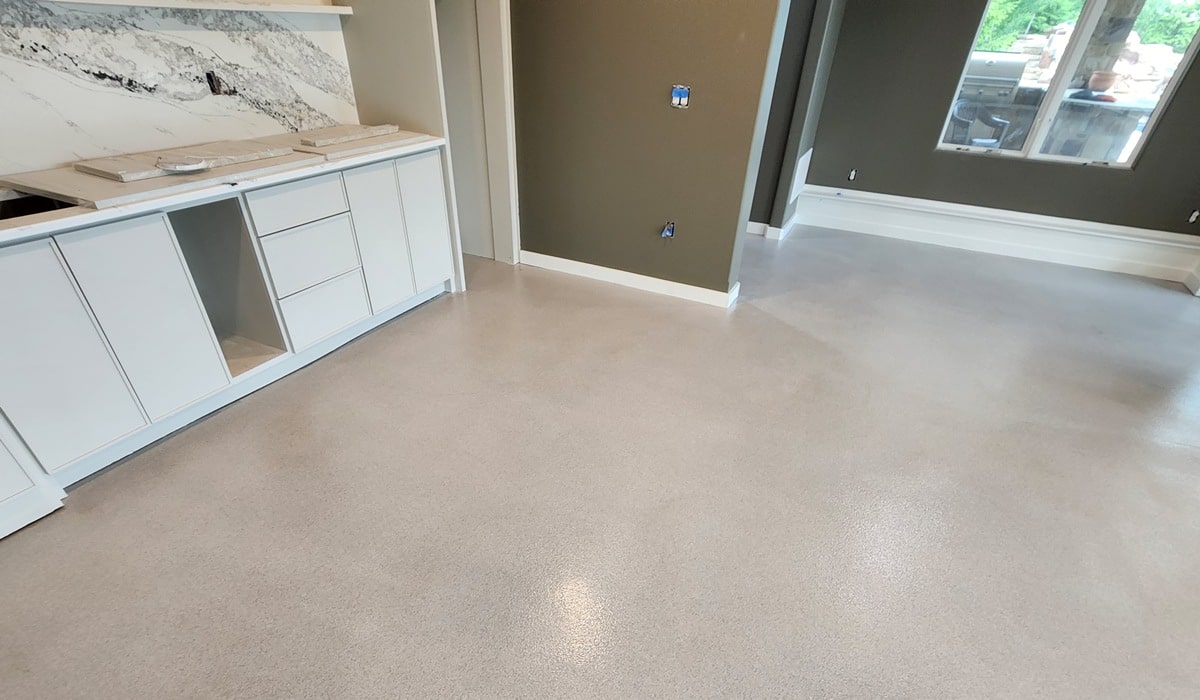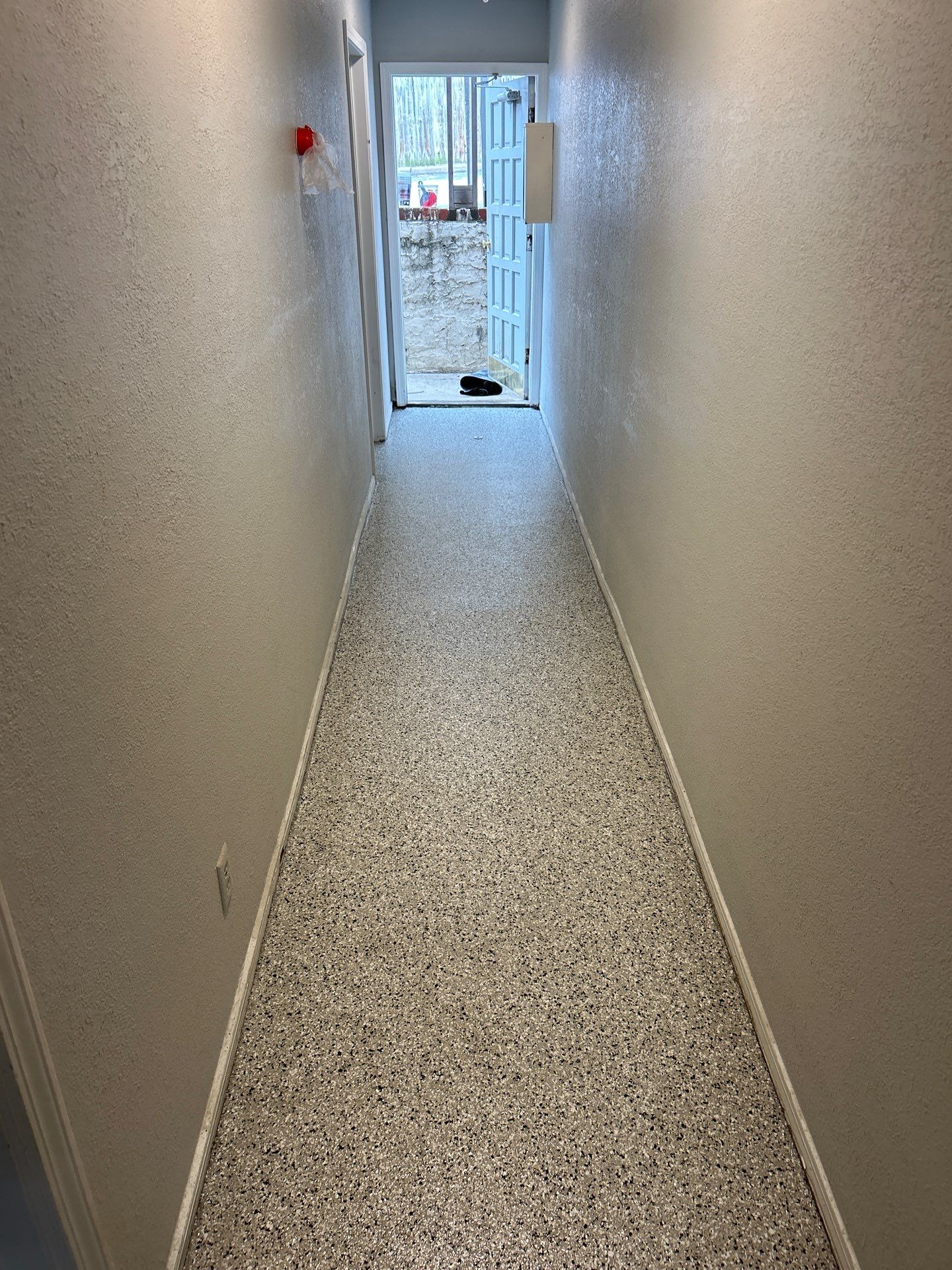If you’re thinking about remodeling, the phrase “epoxy floor coating” has probably come up. Whether you’re upgrading your kitchen, updating the bathroom, or finishing a basement, homeowners everywhere are asking: how does epoxy floor durability hold up in these spaces?
Key Takeaways:
- Epoxy floor coating is highly durable and resistant to wear.
- It performs well in moisture-prone areas like kitchens, bathrooms, and basements.
- Easy to clean and maintain, it’s a long-lasting choice for homeowners.
- There are some considerations regarding installation and surface prep.
- Not all epoxy products are created equal—choose wisely.

Understanding Epoxy Coating: Why It’s a Smart Choice for Homeowners
Epoxy floor coating is a mix of resin and hardener that chemically bonds to create a strong, durable surface. It’s poured over concrete floors and forms a smooth, seamless finish that resists stains, water, and heavy impact. Thanks to its toughness and low maintenance, epoxy has evolved from industrial warehouses into a go-to solution for homeowners looking to upgrade their living spaces with style and durability.
How Durable Is Epoxy in Kitchens?
Kitchens see daily wear and tear, from foot traffic to dropped utensils and constant exposure to moisture and food spills. Epoxy floors can withstand all of this and more, thanks to their tough, impact-resistant surface. They’re non-porous, so spills—whether it’s red wine, tomato sauce, or oil—won’t stain or seep in.
Plus, they’re easy to wipe clean, which makes daily maintenance a breeze. With proper application and care, epoxy floor durability in kitchens can last up to 10–20 years, offering both practicality and sleek visual appeal.
Is Epoxy Safe and Durable for Bathrooms?
Bathrooms deal with water constantly, from splashes and spills to high humidity and steam. Epoxy flooring is water-resistant, making it ideal for these high-moisture environments where traditional materials can struggle.
Unlike tile grout that can mold, stain, or crack over time, epoxy forms a seamless, non-porous surface that actively repels water and discourages mold growth. It’s also slip-resistant when the right texture is added, providing both safety and peace of mind.
What About Basements?
Basements are prone to dampness, temperature fluctuations, and even flooding, which can make choosing the right flooring a real challenge. Epoxy coating offers a strong line of defense by sealing the floor and preventing moisture from seeping through the concrete. It also resists cracking, chipping, and staining—even under heavy storage, frequent foot traffic, or occasional water exposure.
Compared to unfinished concrete or moisture-absorbing carpet, epoxy floor durability in basements is a far more reliable and worry-free option.

Pros and Cons of Epoxy Flooring
Before you commit to epoxy flooring, it’s important to weigh the benefits against the potential drawbacks. Like any material, epoxy has its strengths and limitations. Here’s a clear breakdown to help you decide if it aligns with your home’s needs.
Pros:
- Highly durable and long-lasting – Epoxy floors are built to handle heavy use, resisting cracks, dents, and abrasions over the years.
- Moisture and stain resistant – The non-porous surface keeps water and spills from soaking in, protecting your floor from damage and discoloration.
- Easy to clean – A smooth, seamless surface means dirt, dust, and grime can be easily wiped away without special cleaners.
- Visually appealing with customizable finishes – From high-gloss to matte, solid colors to decorative flakes, epoxy offers a range of looks to match your style.
Cons:
- Can be slippery if not textured – Without an added grip layer, epoxy can become slick when wet, which may pose a slip hazard, especially in kitchens or bathrooms.
- Longer curing time – Epoxy floors require time to fully cure, often several days, during which the area must remain unused. This can be inconvenient for busy households or spaces that need quick turnaround.
- Sensitive to surface preparation – Any moisture, dust, or imperfections in the concrete can compromise adhesion, so thorough prep work is critical.
- May yellow with UV exposure (for sunlit areas) – In spaces exposed to direct sunlight, some epoxy finishes can discolor over time without a UV-stable topcoat.
How to Make Epoxy Floors Last Longer
Durability doesn’t just depend on the product—it also depends on the prep work and application. To get the best results:
- Choose high-quality epoxy made for residential use – Not all epoxy products are created equal. Opt for formulations specifically designed for homes to ensure safety, appearance, and longevity.
- Hire experienced installers – Professionals know how to handle the mixing, timing, and layering needed for a durable, bubble-free finish.
- Make sure the concrete base is dry and clean – A properly prepped surface is essential. Moisture, dust, or grease can weaken the bond and cause peeling or bubbling.
- Apply a topcoat for extra protection – A UV-stable topcoat adds shine, enhances resistance to wear and yellowing, and makes the floor easier to clean.
Regular cleaning and avoiding harsh chemicals will help extend the life of your epoxy floor.
Is Epoxy Flooring Worth It?
For homeowners who want a tough, attractive, low-maintenance floor—especially in kitchens, bathrooms, and basements—epoxy is a smart investment. Its longevity and performance in wet, high-traffic areas make it a practical solution.
If you’re unsure whether epoxy floor coating is right for your space, reach out to Select Coatings. We can help you evaluate your flooring needs and offer expert advice. Call us at 913-349-6689 to schedule a consultation.


